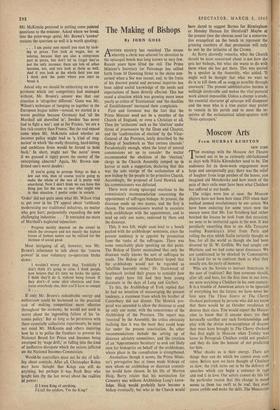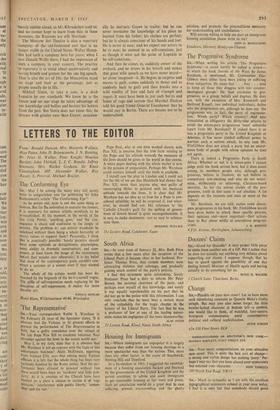Moscow Arts
From MURRAY KEMPTON NEW YORK
THE evenings with the Moscow Art Theatre turned out to be as curiously old-fashioned as days with Nikita Khrushchev used to be. The audiences for its three-week engagement were large and unexpectedly gay; there was the relief of laughter from large patches of the house; you imagined old Mensheviks and how much of the pain of their exile must have been what Chekhov has suffered at our hands.
The critics were less at ease; the Moscow players have not been here since 1923 when their method seemed revolutionary to our actors. We have been enduring for some years now the uneasy sense that Mr. Lee Strasberg had rather botched the lessons he took from that occasion; we went to be instructed again in the new. It was peculiarly unsettling then to see Alla Tarasova reading Raneskaya's letter from Paris and rolling the eyes which Stalin certainly thought so fine, for all the world as though she had been directed by D. W. Griffith. We had sought out Martians and we had come upon dinosaurs. We are conditioned to be shocked by Communists; it is hard for us to confront them as what they usually are, the party of memory.
Who are the Soviets to instruct Americans in the uses of tradition? But then someone should, after all; and here, for the first time in our lives, we were watching a Chekhov in his own century. It is a trouble of American actors to be ignorant of everything but the future; we have never be- fore seen The Three Sisters or The Cherry Orchard performed by persons who did not know that there would be an October revolution to destroy their class. You would expect the Musco- vites to know that if anyone does; yet they heroically sacrifice any such foreknowledge and play with the divine non-acceptance of disaster they must have brought to The Cherry Orchard that first night in Moscow when Trotsky was loose in Petrograd. Chekhov could not predict; and they do him the honour of not predicting for him.
What shocks us is their energy. There are things they can do which we cannbt even con- ceive. Before now we have thought of Chekhov as slow; the trick turns out to be the delivery of speeches which can begin a sentence in rage and end it in love. Our actors cannot do this for the particular reason that this change in mood seems to them too swift to be real; they must pause awhile and make the shift. The Muscovites
merely tumble ahead, as Mr. Khrushchev used to; and we cannot hope to learn from this; in these moments, the Russians are still Martians.
The Moscow Art Theatre is also a repertory company of the old-fashioned sort that is no longer viable in the United States. Walter Hamp- den had such a company here for years; when I saw Donald Wolfit there, I had the impression of such a company in your country. The practice in repertory is to stand about unobtrusively and saving breath and gesture for the one big speech. That is also the art of life; the Muscovites stand on stage and look at the personage, just as people usually do in life.
Mikhail Simi, to take a case, is a drab Lopakin by our standards. We know he is the future and on our stage he takes advantage of our knowledge and bullies and hectors his betters from the past. But Simin does not know this; he dresses with greater care than Gayev; occasion-
ally he instructs Gayev in reality; but he can never overcome the knowledge of his place he learned from his father; his clothes are perfect; but he is always conscious of his hands and feet. He is never at ease; and we expect our actors to be at ease; he seemed to us self-conscious, just as though it were not the point of Lopakin to be self-conscious.
And then he comes in, suddenly owner of the orchard, and he draws in his breath and makes that great wild speech as we have never heard— let alone imagined—it. He begins in surprise and moves to guilt, comes suddenly to threat and as suddenly back to guilt and then breaks into a wild medley of love and hate of- triumph and regret. It must have been in just such bursts and bouts of rage and sorrow that Marshal Zhukov told his good friend General Eisenhower that he would stay in Berlin. There are lessons not to be undervalued.



































 Previous page
Previous page